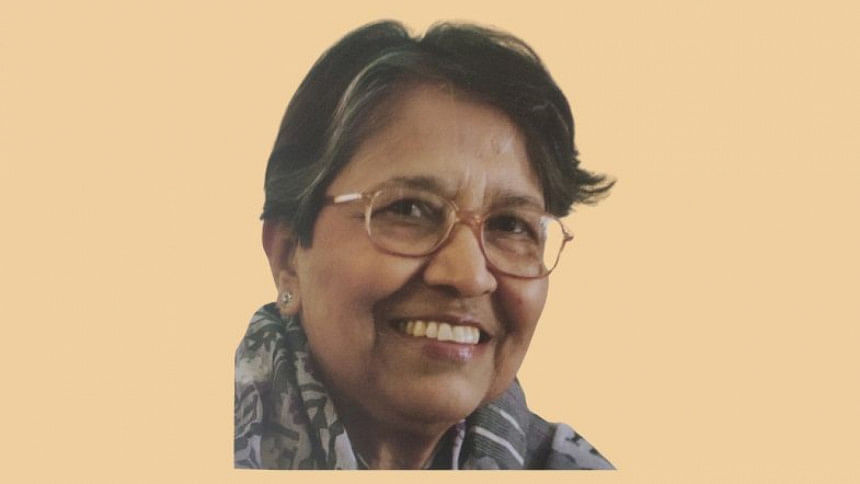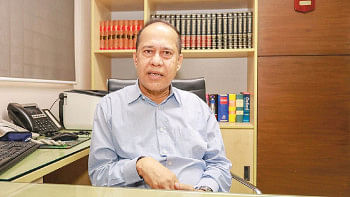A tribute to Jowshan Ara Rahman

It was through a Facebook post on July 11 that I learned that Jowshan Ara Rahman had passed away that day at 1pm. Unfortunately, I got the news too late and could not go to see her for the last time. Earlier, in the years before Covid, when she had been well enough to come to Dhanmondi from Uttara where she lived, she would attend the meetings of Gantha, a women writers' group to which I belong.
Three years ago, I had called her about a book on women writers that Gantha was putting together. I told her that Gantha was interested in including a brief biography of hers in the volume along with an excerpt from her autobiography: Smritikatha Ekti Ajana Meye (2005). She was delighted to learn this and sent me a copy of the English translation of her book, An Unknown Woman, edited by Marianne Scholte (2016). Ateet Theke Adhuna has been published, containing an extract from her book as well as a brief biography. Sadly, she passed away only two months before its publication and could not see it.
Before I met Jowshan Ara Rahman as poet Mahbub ul Alam Chowdhury's wife, I had known her chiefly as involved with the publication of Situation of Women in Bangladesh (1979), edited and published by Women for Women at the request of Women's Development Programme, UNICEF, Dhaka. Although Jowshan is not mentioned anywhere in the book—except in the references of one chapter as the writer of a report on the Social Welfare Mothers' Clubs, we, at Women for Women, were well aware that she supported the book through its publication.
I got to know Jowshan Ara better when I visited her home to interview her husband, Mahbub ul Alam Chowdhury, the poet who wrote the first poem on Ekushey. The interview duly came out on the Literature page of New Age, but, subsequently, I wrote other pieces on Mahbub ul Alam and called Jowshan Ara for clarifications. She was always ready to oblige, often by sending me a related publication which would provide the information I needed.
Jowshan Ara Rahman was a perfect helpmeet, supporting her politically active husband, accepting his long absences, even allowing him to take a precious piece of jewellery from her to support his cause. And it was during the years when she was studying—far from home—or working that Mahbub ul Alam supported her and looked after their daughter.
In the English translation of her autobiography, Jowshan Ara mentions how her life and her husband's were so entwined that, when she was telling her story, she often told his: "In course of writing my story, I have talked a great deal about my husband...In course of telling my own story, I have at times been obliterated in the shadow of my husband's distinct greatness. That is why my tales from time to time have turned out to be the tales of both of us." On his part, her husband often regretted that he had become so well known for that one poem that no one thought of reading his other poems.
Jowshan Ara was born on October 19, 1936 at Chunati, on the way to Cox's Bazaar. Her father, Mahbubur Rahman, was a government servant with transferable postings. Initially, Jowshan lived with her mother and three of her other siblings in their village home. When Jowshan's father was transferred to Chattogram, the family moved to the city and Jowshan started going to Gul-E-Zar Begum Girls' School. In Class 9, she was admitted to Dr Khastagir Girls' School.
In 1952, while Jowshan was preparing for her matriculation examination, her family received a proposal for her from Mahbub ul Alam Chowdhury, the editor of the Chattagram monthly magazine Shimanto. Mahbub ul Alam was both culturally and politically active, and Jowshan had seen him on several occasions. However, they had never met. Mahbub ul Alam asked for a meeting with Jowshan—something quite remarkable for the 1950s. He explained to her that he was politically active and might be arrested at any time. However, he promised that, whatever happened to him, her studies would not be hampered. Jowshan was charmed by the outspoken young man and accepted his proposal. As she notes in her autobiography, at that moment, she understood the meaning of love.
She describes how Mahbub ul Alam was ill with chicken pox when he learned about the police firing on the student procession in Dhaka on February 21, 1952. He immediately wrote a poem, "Kandte ashini, phashir dabi niye eshechhi" (I have not come to weep but to demand they be hanged). The poem was banned and all copies were confiscated. A warrant was also issued for Mahbub ul Alam's arrest. Things, however, calmed down, and Jowshan and he were married on October 10, 1952.
The day after their wedding, Jowshan was to learn how committed her husband was to his party. Without any explanation, he took her heaviest gold necklace and left. It was only 15 years later that she learned that he had contributed it to his political party fund.
Life with Mahbub was fraught with difficulties. He had lost his parents while young and stayed with an aunt, who did not appreciate Jowshan's desire to study. Jowshan was often left alone with this aunt because Mahbub had to go into hiding. Jowshan's father was threatened with losing his pension if he did not reveal his son-in-law's whereabouts. By this time, Jowshan had also become a mother. All these problems, however, did not prevent her from continuing her studies. She completed her Intermediate and BA from Chittagong Government College in 1956 and 1958, respectively.
Things became easier when Mahbub joined an insurance company. In 1960 Jowshan also started working as a community development officer in the Urban Community Development Programme. However, she was told that she would have to get an MA in Social Welfare if she wished to continue working there. This would mean that she would have to leave her family and go to Dhaka. Though initially reluctant, she finally got admitted to the Social Welfare Institute under the University of Dhaka. Jowshan completed the two-year MA in 1966. Meanwhile, she also went abroad for various courses, including one at Victoria University, Wellington, New Zealand under a Colombo Plan scholarship during 1964-1965.
In 1975, while Jowshan was working as the assistant director of Social Welfare, Chittagong, she was informed of her imminent transfer to Dhaka to work with the Social Welfare Mothers' Club Project. Jowshan didn't want to be separated from her husband and daughter again. Fortunately, her husband decided to move to Dhaka with the family.
In May 1979, Jowshan joined UNICEF, Bangladesh, as the chief of the Women's Development Programme. She worked there for seventeen and a half years. She was also instrumental in the incorporation of the macro chapter on women's development in the national Fourth Five-Year Plan (1990-1995).
Jowshan Ara Rahman's autobiography provides details of her private and professional life, describing how a woman from a village near Cox's Bazaar rose to become the first Bangladeshi woman to head the UNICEF Women's Development Programme. However, while telling her own story, she also describes the social conditions prevailing during her time. Though she terms herself Ekti Ajana Meye/An Unknown Woman and though she kept very much to herself especially during the last two decades of her life, she should be better known—and in her own right.
Niaz Zaman is a retired academic, writer and translator.
Views expressed in this article are the author's own.
Follow The Daily Star Opinion on Facebook for the latest opinions, commentaries and analyses by experts and professionals. To contribute your article or letter to The Daily Star Opinion, see our guidelines for submission.

 For all latest news, follow The Daily Star's Google News channel.
For all latest news, follow The Daily Star's Google News channel. 










Comments